Locative Feminism
[prologue] is a mutating platform for the formulation of a feminist aesthetic politics which reacts to and acts upon the New Europe as it impacts on women’s lives. Artist and participant Emma Hedditch followed it from its planning symposium in Graz to its problematic culmination in an exhibition at the Cornerhouse, Manchester. [prologue] New Feminism/New Europe runs until 18 September 2005
The [prologue] new feminism/ new Europe project grew out of discussions held at Mladinski Kulturni Centre, Maribor, Slovenia, in 2004, hosted by the director Dragica Marinic. The invited women were Diana McCarty (member of Bootlab, Berlin), Reni Hofmueller (engaged artist with feminist background, Graz), Eva Ursprung (curator and sound/ free improvisation artist, Graz), Agnese Trocchi (member of Candida TV, Rome), Marina Griznic (professor at the Academy of fine arts Vienna, artist, media theorist, art critic and curator, Ljubljana), Kathy Rae Huffman (director of visual arts, Cornerhouse, Manchester), Milena Deleva (InterSpace, Sofia) and Agnieszka Wolodzko (Laznia Centre for Contemporary Art, Gdansk) who joined by email.
Some of the women had already worked together, Diana McCarty and Kathy Rae Huffman with Vali Djordjevic started the women only mailing list FACES founded by in 1997. FACES worked with Eva Ursprung in 1998 at Forum Stadtpark, Graz, and Eva has worked with Reni on projects since the 1980’s. I heard Marina Grzinic in a discussion with Kathy Rae Huffman in 2002 at the group show Mons Veneris: Female Geographies, exhibiting works on sexuality by women artists from so called post-communist countries, curated by Rosa Reitsamer with Anthony Auerbach at the Austrian Cultural Forum in London, where also some of the early movements of the [prologue] project happened.
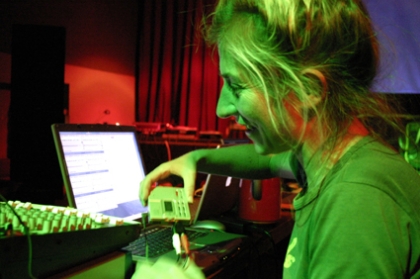 > Reni Hofmuller, Graz, May 2005. Photo by Frau von Noeten
> Reni Hofmuller, Graz, May 2005. Photo by Frau von Noeten
The [prologue] project therefore was not so much conceived, since such a project is not begun from scratch, but evolved as a continuum from a base of existing operations. Albeit improvised, some specific structures and strategies were nevertheless set with which to open out the discussion in public, get money, support others etc. Based on experiences and with a leaning towards experimentation. Although the process of discussion in Maribor has not been presented publicly, the following ambitious statement, or consolidation of ideas was produced:
[prologue] will take a specific interest in examining the new context for the social/ political position of women in the new Europe through art and media. It will also be looking at the new female networks, and how these activities bring about a new feminist perspective. A key aspect of the project will be to analyse a new female lens, and reveal the new socio-economic position of women in Europe, and how it affects their political force. [prologue] will address the huge prejudice against the word ‘feminist’ and will include political, queer, transgender and refugee positions to unite race class and gender. [prologue] will show what has been left out of feminist understanding in Europe and give a future impression on the new united feminist position.
[prologue] became the name with which the group chose to speak, without restricting their individual movements still naming themselves and remaining open for other people’s engagement. It is not clear if statements are written and decisions made collectively, which is something I would be interested to know about. Nevertheless there have been acts and a schedule for the project is set.
[prologue] is a symposium in Graz, 8 –10 May 2005. [prologue] is an exhibition that will start during the symposium, until 22 May. [prologue] is this journal that contains the program of the symposium, descriptions of the exhibited works, and serves as an archive of current positions. [prologue] is an exhibition in Manchester in July 2005. And [prologue] hopefully gives an insight in the ongoing discussion.
I want to write about the [prologue] project, the artists, institutions and audiences involved, with an eye on it’s construction and some of the intentions written about by the group who met in Maribor. I am not going to compare the ideas with their outcomes, but look at how written intentions are already actions, acting as catalysts to further exchanges. These actions could even have outcomes that were not necessarily intended. I consider this acceptance as connected to a radical feminist politics that seeks to shift hierarchies to a lateral structure and extend the production and distribution of knowledge.
I went to the [prologue] symposium in Graz, 8 – 10 May 2005, and was invited to make a presentation, and a text for the journal. I wanted to go because I wanted to meet the people there and be part of the discussion. I had the idea that this was going to be a discussion about the forthcoming exhibition at Cornerhouse, Manchester in July. When I arrived in Graz airport and was found by another participant Sol Haring, who spotted me, a lone bemused looking woman, her friend Anita offered to drive me to ESC im labor, where the symposium would take place. Reni Hofmuller greeted us there. Reni is the main point of contact for the [prologue] project in Graz.
ESC im labor was founded in 1993 after the dissolution of several projects in the city, including Eva & Co with Eva Ursprung and FrauenInitiative Fabrik whose space ESC took over before moving to their current location. ESC has been running workshops in Fidonet (early file sharing network) ‘Internet for Women’ and established mur.at with Martin Schitter, Winifried Ritsch and Jogi Hofmuller following the closure of the universities infrastructure for artists. ESC is an active space of collaboration. Reni had originally come to Graz to participate in experimental and improvised singing at the Jazz academy in 1989, and continues as an improvising sound artist. I asked Reni how these experiences influenced her current activities.
Improvising in music for me means to create a situation: a situation of creating a space, a situation where listening to each other is the core, the heart of the action, and it only works out if this creating and giving room to each other is essential. This probably has a much broader impact on everything I do than I am even aware myself. So, appearing also as improvising sound artist, is a political and structural decision (Reni performed at the opening night of the symposium in Graz with Eva Ursprung and in collaboration with others for Jamika Ajalon’s performance Trans_Narratives in Manchester.)
Reni goes on to explain: In the art/culture surrounding I mostly think about the paradox situation of how to combine working realities like means of production, accessibility to them, to knowledge, and how to set up a space where this contemporary way of cultural production can be made understandable for an interested audience without forcing anybody into a too narrow frame; my experience is that there are a lot of missing links between artistic articulation on the one hand, and "readability" for audiences on the other. I admit, I do focus more on the needs of artists in my organizational work, and then try to create an atmosphere that makes also abstract work accessible for visitors/audience.
Looking at [prologue], this could mean: there are a lot of women involved who have really different roles and local situations. We tried to create a system in which the knowledge and capabilities could be shared. The ambitions we had, were much bigger, involving more physical spaces with again other characteristics, travelling more, and by this constant process of reflection finding out more about differences.
Reni has been working with Eva Ursprung since the late 80’s; Eva founded Eva & Co a feminist cultural magazine with a changing group of women including Veronika Dreier, Doris Jauk Hunz, Rika Thummel and Brigitte Krenn. Eva was a punk and new wave musician and continues to make free improvisation music. In 1992 Eva & Co closed, but Eva founded Kunstverein W.A.S. (Womyn’s art support) and in 1997 became the curator of Forum Stadtpark Graz. She went on to found the local women’s mailing list 42, with Reni Hofmuller. In 2003 Eva, together with Veronika Dreier, founded the project BAODO im NIL, a café and art space run by African refugees, in Graz. We went to eat at the café during the symposium. I asked Eva for some reflections on her collaborations and how she began making projects, and how those experiences worked in the frame of the [prologue] project.
I started to work with other people when I was approximately 16 years old. Together with students, who were mostly much older than me, I made a magazine for culture and politics. We also organized exhibitions and film screenings, and this was my first platform for my own art production. As part of a group, you don’t have to know precisely all techniques and skills needed for a bigger production, but in a good collective you have the chance to learn a lot in collaborative processes, which is much more fun than learning in hierarchic structures or from books. I never attended an art school: all I learned was in collaborative group situations, including people with different skills and knowledge. Later I started to play in bands. I experimented with all instruments: drums, guitar, bass guitar, and synthesizers. At the end I tried to play saxophone, and this is still my favourite instrument.
As Reni and I are also used to work in non-hierarchic environments, apart from their special skill, everybody tries to understand the complete thing. Switching to the structures at Cornerhouse was quite problematic at the beginning: everybody there has precisely his or her special task, and you can’t discuss problems in a more comprehensive sense. There is also no possibility to react to new ideas spontaneously, everything is precisely planned and fixed in advance. I prefer the processes of free improvisation, but on the other hand the results in situations like Cornerhouse are more predictable, and there is more security that things will be in the right place at the end :-) it is really a matter of the philosophy you prefer.
The exhibition at the Cornerhouse, Manchester was already fixed by the time we arrived in Graz, a printed leaflet was on display at ESC. What will we be discussing here? Reni hands me a copy of the [prologue] journal, and gives me directions to the place we are staying. I still can’t normalise these travelling experiences, nor do I want to, but it has become part of the process of making collaborations and developing projects. I have some understanding of the position of the artists in this situation and consider how these artists position themselves in relation to some of the questions of the [prologue] project and if the works could really reveal this position? Who and what are defining the project’s output, its public representations, publicity images and contextualisation of works? If we consider the organising group and the artists’ work and identities as shifting experimentation, how can it be accommodated/ represented in all its performative roles and expressions? These questions are not particular to the [prologue] project, but they are questions that I hoped would be addressed in the project.
The [prologue] journal was conceived and edited by Marina Grzinic; it is an attempt at presenting the position of some of the organising group, their histories and what their current position is. It introduces the artists in the exhibition in Graz: Esther Straganza and Elke Auer, Senam Okudzeto, Doris Jauk-Hinz, Gertrude Moser-Wagner, Marina Grzinic and Aina Smid, Nina Stuhldreher and Bonelli Bonelli. Others texts are by some who are engaged in the questions of [prologue] ‘about theory, activism, criticism, the visual and the political on new [Post] and [trans] feminist forces in the territory of [new] Europe’ they are Rosa Reitsamer and Jo Schmeiser, Suzana Milevska, Sol Haring, City of Women, Natasa Govedic, Vlatka Frketic, Seda Gurses, Eva Egerman and myself. The journal is available to buy from the Cornerhouse, Manchester and ESC, in Graz. It gives us something to hold on to and refer to in these complicated discussions and experiences of feminist politics, performances and visual art works. In the opening text, Marina Grzinic writes:
Today every situated (that is, implicated, contaminated) art production and cultural initiative within the global world opens a space of collaboration, dedicated to life and resistance. The crucial point is to name the process and the new political subject. Furthermore, it is necessary to identify the ways in which this new subjectivity functions and what are the strategies implied in order to produce paradigms of resistance toward the Capital machine. Capital functions as the evacuation of spaces; it is a constant production of non-spaces.
Marina opens the question of how to locate a new political subject, in ourselves and out of ourselves, culturally. What locations can this subject be connected to, or be supported and reassured by? She seems determined to reinstall the political subject within this feminist project and in the given location of ESC which could be considered one of the less ‘evacuated spaces’. Marina works hard to encourage us to pursue a line of locative personal narratives and histories in our relation with each participant. She keeps emphasising that process, during the symposium in her careful introductions, and surrounded by the exhibition.
The symposium talks shift between artists and activists who are discussing their works, and theoretical investigations incorporating the work of artists and activists, and ideas of representation. This feels complex and sometimes painful, when artists or activists are not there to speak of their intentions. There is a concerted effort made to radically shift some of these structures, and reduce the influence of purely academic arguments from well read theoreticians such as Judith Butler or Donna Haraway and look at more local biographies and experiences of the women present.
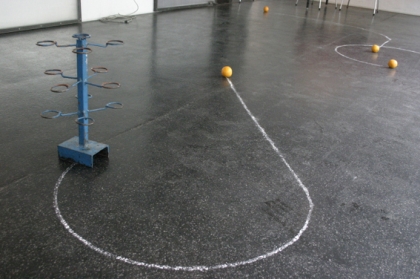 > Portes Oranges by Senam Okudzeto, ESC, Graz, May 2005. Photo by Frau von Noeten
> Portes Oranges by Senam Okudzeto, ESC, Graz, May 2005. Photo by Frau von Noeten
Senam Okudzeto talks openly about her work Portes Oranges, which consists of the stands for displaying oranges made by working women in Ghana and a video documenting women and their stands in Urban Accra made in 2004 – 2005. Senam’s shifting identification with Ghana, her family relations there, make for complex exchanges in addition to her position as a an artist working in Europe. Senam tried to buy a stand from one woman, but the woman refused. Senam persisted and eventually the woman sold her stand after encouragement from other stallholders. On returning to Europe an art dealer offered a larger sum of money for the stands which, out of context, appeared as a simple modernist form. Senam refused although she admits to being tempted given her financial position at the time. Senam performed an act and took the stands through the process, and she has to carry them around with her in a large suitcase. In the exhibition she carefully marked out in chalk on the floor maps, designs, pointers, or charts of her own changing position.
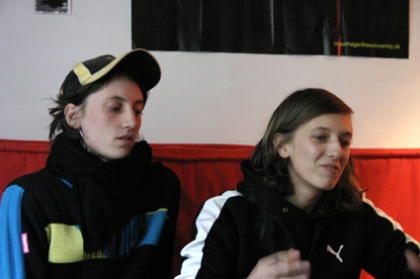 Esther Straganza and Elke Auer, ESC, Graz, May 2005. Photo by Frau von Noeten
Esther Straganza and Elke Auer, ESC, Graz, May 2005. Photo by Frau von Noeten
Esther Straganza and Elke Auer, invite the symposium audience into their installation. Together they have a web space Cuntstunt.net, derived from a zine with the same name that they have made with Eva Jantshitsch since 2003. For [prologue] their project is called I am, She is, We are – Working On Fire. It is a reconstruction of a room they stayed in Bangkok last year on exchange from the Art Academy in Vienna. During their exchange they began to research the position of women doing ‘precarious work’ in Bangkok.
We are interviewing women from different social contexts about their precarious working circumstances and investigating and reflecting our own working situations to find out how they and we define and experience this something we call precariousness. Wir sind vieles und wir sind zu zweit: Navigators, students, artists, researchers, illustrators, writers, project managers, contact and press officers, bookkeepers, interviewers, transcribers, sound editors, housewives, plus everything else what is needed from time to time.
Now back in Austria they seem to try to make sense of their experience, and present some of the biographies of women they met on the cunstunt.net web space whilst inserting themselves into the frame, they explain themselves as artists and as precarious workers, and refusing certain rituals of presentation in their work. In this presentation of their project they acted informally with audience members simply moving around in their space and using certain objects, this continued throughout the symposium where you could regularly find people sitting in the space having meetings, or listening to music etc.
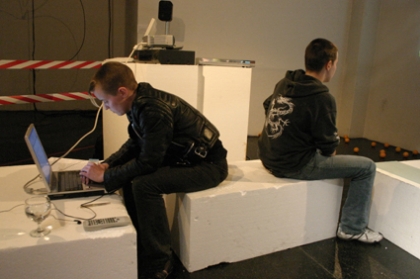 Bonelli Bonelli, ESC, Graz, May 2005. Photo by Frau von Noeten
Bonelli Bonelli, ESC, Graz, May 2005. Photo by Frau von Noeten
TEMPORARY INSTALLATION by Bonelli Bonelli was performed at the end of the symposium weekend at ESC. Dorian and Cris’s performance immediately reflected back the possibilities of the project, it asked who and what we are talking about and why and for whom. Cris recorded audio, just her voice on a CD, which she plays on a stereo. It is a confession or account of her feelings about her gender, about being a woman but not feeling like a woman and how that is played out in this context and on the street, after playing it she takes out the CD and pours latex over it, and leaves it on one of the big white polystyrene blocks that are part of the furniture at Graz. Dorian who has been sitting with a laptop slowly begins to type, and her typing is projected on the wall. She asks, ‘what is this, what are we doing?’ and keeps typing as though this is a safe and detached mode of communication.
Sociologist, writer and DJ Rosa Reitsamer wrote the text ‘Shared Territories – Divided Territories’ with artist and writer Jo Schmeiser. The text is a consideration of ‘the co-operations between individuals and groups with different social positions, different political rights and thus different chances within Austrian society’ Rosa’s talk at the symposium is a continuation of their critique and self-exploration of the term ‘whiteness’ as a social construct that has become a social reality. Rosa and Jo’s text ask crucial questions that in particular address the fields of culture and visual arts in Austria, and should also be applied to the [prologue] project,How can moments of solidarity and alliances between activists, artists and theorists with different backgrounds be facilitated? Which conditions are needed in order to establish spaces for anti-fascist, anti-racist and queer feminist work? Which strategies have been developed against structural discrimination in the fields of culture and the visual arts?
How is this addressed in the project’s construction? Did we get to criticise these exploitations, radically and rhetorically. How to foster actual unification, as the [prologue] project proposes if the socio-economic position and political force improves for some women and not others? There is a long history of involvement in these questions within the organising group of [prologue], women that were active at a grassroots level in the 1980s. These women are now working for larger institutions, and are beginning to transfer that political attitude to their situation. For this project they are working with younger women who have passed through the current neo-liberal political framework.
Kathy Rae Huffman is the Director of visual arts the Cornerhouse, in the [prologue] journal she talks of her long history of engagement with art and new media practices that are informed by feminism. Kathy sites working with the ‘Women’s building’ in Los Angeles around 1979, after her appointment as curator at Long Beach Museum of Art, and more recently during the ‘90s, after moving to Europe, her collaboration with Eva Wohlgemuth and the project Face Settings which, in 1997, eventually became the women only mailing list FACES founded by Vali Djordjevic, Kathy Rae Huffman and Diana McCarty (http://www.faces-l.net). Since 2002 Ushi Reiter who joined in 2003 has facilitated the FACES mailing list, Ushi presented the new content management system for FACES at the symposium in Graz. Kathy explains her commitment to developing tools within media technologies to work with artists.
In Feminist Art today, we see that the knowledge base and history of theoretical, curatorial and artistic practice is accessible to young artists around the world. They begin from an informed position, accepting and rejecting ideas, and positions taken by artists and curators
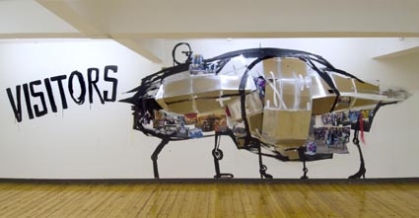 Last Night they Landed, Blob by Chicks on Speed, Cornerhouse, Manchester July, 2005
Last Night they Landed, Blob by Chicks on Speed, Cornerhouse, Manchester July, 2005
The [prologue] exhibition at the Cornerhouse, Manchester opened in July with a weekend of live events that regrouped some of those attending the Graz symposium, and introduced new characters to [prologue] project. Artists exhibiting are Chicks on Speed, Hito Steyerl foreign investment, Beverley Hood, Katarzyna Gorna, Frances Goodman, Senam Okudzeto, Tanja Vujinovic & Zvonka Simcic, Anna Jermolaewa, Mare Tralla. Performing at [prologue] Live weekend are Tanja Ostojic, Chicks on Speed, Nicole Pruckermayr, Boriana Dragoeva-Rossa, and in the screening room works by Jamika Ajalon, Candida TV, Chicks on Speed, Eri Daka, Katarzyna Gorna, hajnal Nowicka-Grochal, Otolith Group, Laura Pawela, Sabine Maier, Anita Morth & Sol Haring, Mare Tralla and Boriana Ventzislavova with Miroslav Nicic. With screening events during the exhibition of video works by Marina Grzinic and Aina Smid and the Independent Heroines film festival on tour.
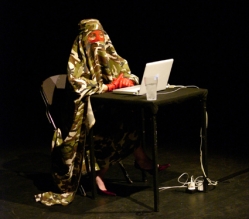 > Integration Impossible by Tanja Ostojic, Cornerhouse, Manchester, July 2005................................................. Tanja Ostjic performance Integration Impossible begins with her construction of an image of herself, wearing a specially designed Burka style outfit, made of green camouflage fabric and red gloves and shoes poking out. In the formal theatrical setting, Tanja sits at her ibook with a large projection at the back of the performance space, and introduces the question of EU passport ownership, through presentation of her relentless work, sighting herself, and passing through a process in an absolutely radicalised approach and execution. In Looking for a Husband with EU passport (2000-2002), Tanja made an image of herself naked with the title Looking for a Husband with EU passport down one side and her contact details at the bottom. The image was circulated beyond the original parameters she had set, of art magazines and where she had placed it on the Internet. Responses began to come from a number of demographics. Tanja’s act is both pragmatic given her own circumstances, living in Belgrade, and in raising the question in cultural contexts of the right to citizenship in a democratic community. Eventually she performed a marriage to a German man and now continues the project by attempting to integrate into German society and in particular the art scene continuing to document these efforts. During the performance Tanja has de-robed and is now wearing a red dress and shoes, as she takes questions from the audience.
> Integration Impossible by Tanja Ostojic, Cornerhouse, Manchester, July 2005................................................. Tanja Ostjic performance Integration Impossible begins with her construction of an image of herself, wearing a specially designed Burka style outfit, made of green camouflage fabric and red gloves and shoes poking out. In the formal theatrical setting, Tanja sits at her ibook with a large projection at the back of the performance space, and introduces the question of EU passport ownership, through presentation of her relentless work, sighting herself, and passing through a process in an absolutely radicalised approach and execution. In Looking for a Husband with EU passport (2000-2002), Tanja made an image of herself naked with the title Looking for a Husband with EU passport down one side and her contact details at the bottom. The image was circulated beyond the original parameters she had set, of art magazines and where she had placed it on the Internet. Responses began to come from a number of demographics. Tanja’s act is both pragmatic given her own circumstances, living in Belgrade, and in raising the question in cultural contexts of the right to citizenship in a democratic community. Eventually she performed a marriage to a German man and now continues the project by attempting to integrate into German society and in particular the art scene continuing to document these efforts. During the performance Tanja has de-robed and is now wearing a red dress and shoes, as she takes questions from the audience.
The video still from Hito Steyerl’s November which is screened in the exhibition, was used for the exhibition poster; I see it all over the city. The image is of Hito’s close friend Andrea Wolf on a motorcycle, performing in a feminist action film begun when the two were seventeen years old but never completed. Andrea Wolf later became a member of the PKK, and wanted in Germany in connection with the Red Army Faction. She was assassinated in 1998. In the video November, Hito investigates how the image of Andrea Wolf mobilises a revolutionary ideology, similar to those that have been played out in marshal arts films. The video questions the continued use of the image of Andrea Wolf as a martyr by the PKK and studies the action film they made together at seventeen years old, of which they shot only the fight scenes, women overthrowing men, and Andrea riding off on her motorcycle into the sunset. When I arrive at my hotel, live footage is broadcast on a TV in the reception area of two men suspected of the attempted bombings in London on July 21st, being arrested in West London.
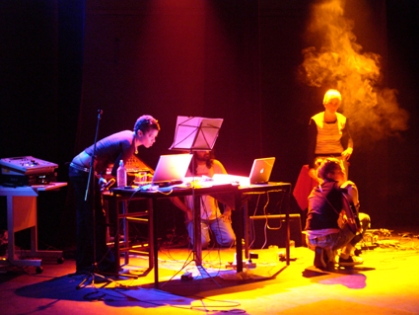 > Trans_Narratives by Jamika Ajalon, Cornerhouse, Manchester, July 2005
> Trans_Narratives by Jamika Ajalon, Cornerhouse, Manchester, July 2005
London based artist Jamika Ajalon performed Trans_Narratives (transnarratives.com), working with female musicians from Manchester, London, Reni Hofmuller and Eva Ursprung from Graz and Rosa Reitsamer from Vienna. The performance, combines some explanatory texts about her practice, which become content, and displays video material from a recent work and exploration of Graz, cycling with the camera around the city, broken by short glimpses of the scene outside Stockwell tube station in London, following the shooting of Jean de Menezes by police on July 22nd.
As part of my research and practice I acted as a kind of meta-reflexive anthropologist, collecting data and recording my observations which became the online journal accompanied with a series of stills snatched visuals I shot and edited while in Graz. Trans-narrative(s), as with other works of mine, centres around the politics and poetics of subjectivity as it relates to the urban landscape.
The music is improvised, and the text performed by Jamika, articulates an attempt at explanation that falls on improvisation as a way out of false information. Working in collaboration, she positions the experience of improvisational music making with individual participants across the [prologue] project. This gives some way out of the question of unification, that fails to acknowledge the position and different experiences of individual women. And problematises the process that makes that position public, as a de-rationalised, complex process/ presentation.
The [prologue] project I hope will continue to address a contemporary feminist debate, by engaging many more participants in a position of discursive and sometimes antagonistic action. By producing and circulating texts, performing and presenting visual art works, in multiple locations whilst acknowledging the importance of actualising such conceptual challenges and the process that involves. The symposium in Graz and the [prologue] journal made strong attempts to look at the structure of the project and the positions of the initial organising group. I felt disappointed that this open structure was not carried over to the Manchester exhibition project, which seemed to retain many conservative models for exhibition structures, and provide few places for exchange and dialogue to happen, despite what seemed like a desire to do so. The live events broke with this restriction, since they allowed immediate confrontation with the situation, and the intentions of the artists, coupled with the social experience and coming together of audience and actors involved in the [prologue] project.
In the last day of discussions at the [prologue] live weekend in Manchester, Marina Grzinic points out that
Feminist politics that will embrace radical democracy is that that will display in texts and critical writings and as well in works of art operations that are hiding the social antagonism. This is also coming back to the idea of articulating forms of life and modes of making art that also open the questioning of the system of liberal democracy and as well articulating what that means today, what are the conditions of being sexed subject? A shift is needed from understanding to a radical critique of domination, injustice and inequality. These topics and these fields are for me setting clear limits within rationalist and universalistic discourses in Europe.
Mute Books Orders
For Mute Books distribution contact Anagram Books
contact@anagrambooks.com
For online purchases visit anagrambooks.com






